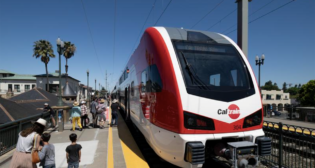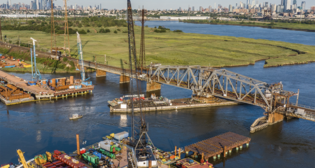
Toronto’s troubled trolleys
Written by John Thompson, Canadian Contributing EditorThe Toronto Transit Commission (TTC) has been experiencing significant delivery delays and quality control issues with its 204-unit order of new low-floor LRVs from Bombardier Transportation Canada Inc. The contract, valued at an estimated $C1.2 billion, was awarded to Bombardier in June 2009, with assembly to be completed at its Thunder Bay (Ontario) plant.
Bombardier and earlier companies located at this plant have been virtually the sole supplier of subway cars and LRVs to the TTC since the mid-1960s.
The contract had specified that about 50 LRVs should be on the property by mid-2015; instead, the quantity was seven. Part of the delay was due to a 47-day strike at the Thunder Bay facility during summer 2014.
However, there have also been serious issues with Bombardier due to the poor quality of certain components for the cars, especially body panels produced by the company’s Mexican plant. A Bombardier spokesman told Railway Age that outside suppliers are located in the United States, Spain and other European countries.
The result has been inventory shortages at Thunder Bay, a situation that has been worsened by the inferior quality of the Mexican product: walls and doors out of alignment and not fitting together properly. The TTC has refused to accept any cars until they pass its strict quality review. Those that have been accepted have been operating quite satisfactorily to date in Toronto, including the severe 2014-2015 winter the city experienced.
The seriousness of the LRV situation was highlighted in mid-June 2015 when TTC CEO Andy Byford and Commission Chair Josh Colle met with Bombardier management in Thunder Bay to ascertain first-hand the nature and depth of the problem. Colle subsequently stated that he believed the company had made significant improvements that would help to correct the issues. Bombardier has replaced senior personnel in charge of the manufacturing line, and improved parts testing to insure they are ready for assembly upon arrival at Thunder Bay.
The company spokesman told Railway Age that Bombardier is providing additional training for employees in Mexico, revising production methods, and establishing quality assurance teams. He said that there have been no issues with the trucks and controls, which are produced in Europe.
However, Bombardier has yet to commit to the TTC’s request for a delivery schedule of one car per week, in acceptable condition, commencing July 31, 2015. The contract stipulates a delivery schedule that outlines a Technology Verification Program (for three prototype cars); and penalties for non-performance.
Since awarding the contract, the TTC has granted Bombardier three time extensions:
• Six months to incorporate changes required to improve accessibility (the wheelchair ramp); wheelchair positions; PRESTO (fare card) machine placement and fare enforcement modifications as a result of stakeholder consultations.
• Fifteen weeks of equitable adjustment to allow for workflow changes to a paint system for the truck frames known and proven at the TTC, as opposed to a paint system that was proposed by the supplier as meeting specification. This assures proven long life in the Toronto environment of high road salt content in winter.
• Makeup time due to Bombardier’s 47-day work stoppage by employees at Thunder Bay.
“We had to have Bombardier redesign the accessibility ramp,” TTC streetcar engineer Steve Lam told Railway Age. “The ramp is a European design by Faiveley. We needed a ramp that could work at both street level and at a loading platform. The original design did not meet our specifications; the transition between the door and the ramp was unacceptable.”
The TTC states that during 2013 and 2014 it worked with Bombardier to design and build a specifications-compliant accessibility ramp and ramp-door threshold interface, to appreciate the challenges the company faced in transferring technology and manufacturing from Europe, and to improve on production quality.
“Despite continual TTC CEO /Bombardier President-level conversations on delivery between the two organizations, the challenge to produce quality vehicles has unfortunately proven to be too formidable,” said Andy Byford. Bombardier has continued to restructure and retool to recover the delivery schedule. It submitted a revised delivery schedule on June 1, 2015 that takes into account the above time extensions, delays related to production and quality difficulties,; and various claims. In this schedule, Bombardier committed to completing the delivery of 27 LRVs for acceptance by Dec. 31, 2015, and completion of the entire order in 2019. The contract called for 73 cars by year’s end.
The proposed schedule is being reviewed by the TTC for acceptability, together with Bombardier’s recovery plan. This plan outlines the carbuilder’s effort to increase production capacity and improve on build quality at its Thunder Bay and Mexico plants, and on product quality and support from its supply chain. A new Baseline Delivery Schedule will be considered upon completion of a TTC technical assessment, and negotiation of pertinent commercial terms in accordance with the contract.
However, the TTC, based on supporting documentation to date, and its staff’s assessment of production readiness in Thunder Bay and Mexico, is not optimistic about Bombardier meeting the June 1 schedule, according to a report Byford submitted to the Commissioners.



